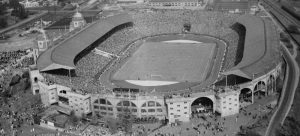FA Cup (The First Half)
The 2018 FA Cup Final took place last weekend, with Chelsea beating Manchester United in a tedious match between familiar opponents. Chelsea (who had won a single Cup, in 1970, before 1992) have now reached 10 Finals since the Premier League began, winning 7; Manchester United have appeared in 9 and won 5 of those. Together with Arsenal (8 wins since 1992), these three sides are by far the most successful Cup teams of the Premier League era. The predictability of the top teams lifting the trophy is only one of the factors which have combined in recent years to reduce the appeal and prestige of the FA Cup, for most of its existence regarded as the world’s pre-eminent knock-out competition. In addition to reflecting the Premier League’s near-total dominance over English football, the Cup has also been devalued by the reduction and removal of replays, the playing of semi-finals at Wembley, and the fielding of weakened teams (especially in the earlier rounds).
In 1991, the FA replaced multiple Cup-tie replays with a single replay, followed by penalty kicks after extra time, starting with the 1991-92 competition. Replays were, and remain, often lucrative for lower-division sides, and added to the unpredictable nature of the early rounds; possibly the most famous ‘upset’ of all, when Hereford United, then of the Southern League, defeated top-flight Newcastle United in 1972, took place in a replay.
There could be a series of replays, notably a record six games and eleven hours before Alvechurch overcame Oxford City in the Fourth Qualifying Round of 1971-72. The 1980 semi-final required three replays to separate Arsenal and Liverpool, before it was decided that the semi-finals should be settled in one game from 1999, with extra time and penalties used to determine the outcome if the game ended in a draw. The Arsenal-Manchester United tie of 1999, with Ryan Giggs’ celebrated winning goal, was the last semi-final replay.
Up to and including 1998, when a single game and a penalty-shoot was introduced, a replay was required for a drawn final (Arsenal’s victory over Manchester United in 2005 was the first to be settled by penalties). On 14 occasions the final had to be replayed – the first in 1875, when Royal Engineers needed a second game to overcome Old Etonians, and the last being in 1993 between Arsenal and Sheffield Wednesday. Two of the Cup’s classic games came in final replays: Chelsea-Leeds (at Old Trafford) in 1970, and Tottenham-Manchester City in 1981. These games became part of the Cup’s folklore, but clubs with an eye on the lucrative Premier League, complaining of fixture congestion, successfully lobbied for their removal.
Wembley had been the traditional venue for the FA Cup Final since 1923’s ‘White Horse’ final took place at the newly-opened ‘Empire Stadium’, and reaching it for the season’s showpiece was the pinnacle of many players’ careers. It was not until 1991 that Wembley hosted a semi-final for the first time, between Arsenal and Tottenham; in 1993, both semi-finals took place at Wembley after the Sheffield derby between Wednesday and United, was switched from the original venue of Elland Road. These were regarded as temporary exceptions at the time but, from 2008, all semi-finals have taken place at the re-opened Wembley Stadium, with Old Trafford and Villa Park (in 2007) remaining the last of the many other venues to host semi-finals. The FA’s decision was largely a financial one, given the huge expense of rebuilding the stadium (estimated at £750m and counting), but has contributed to reducing the achievement of ‘going to Wembley’.

The Empire Stadium – Wembley, 1923